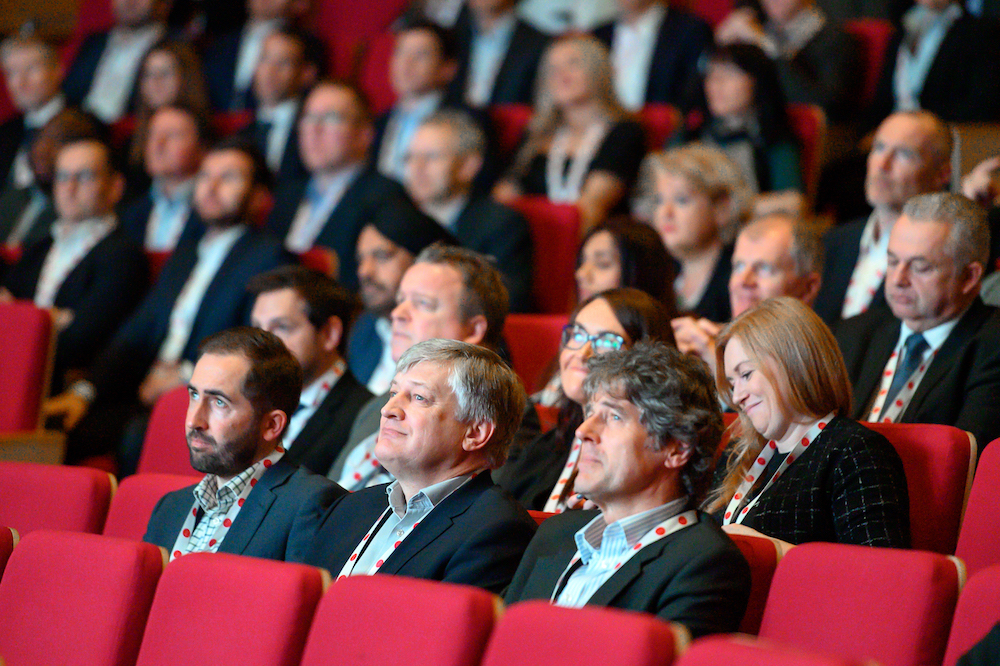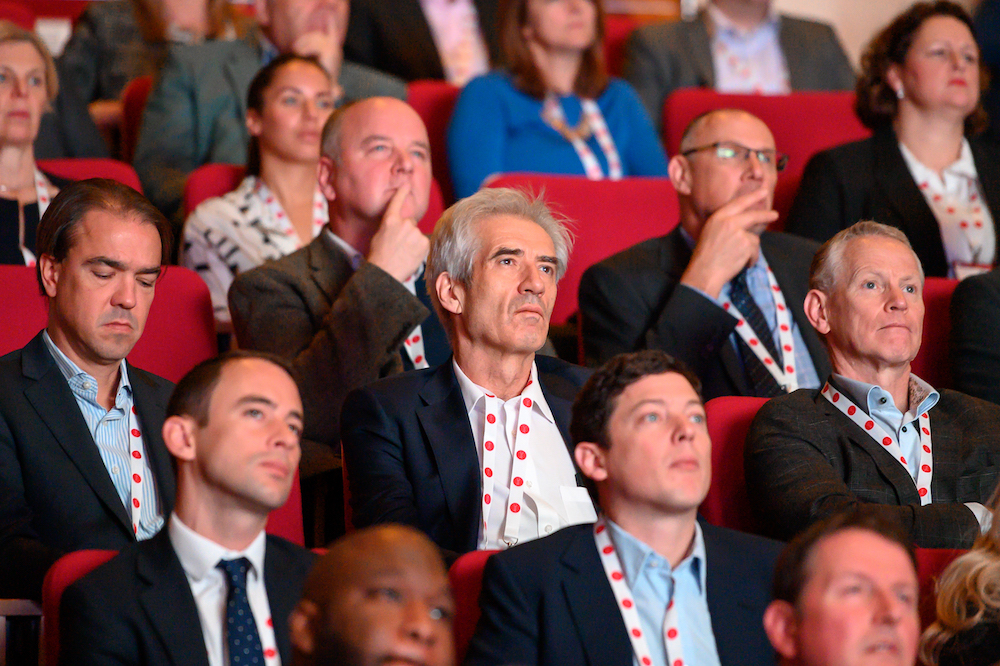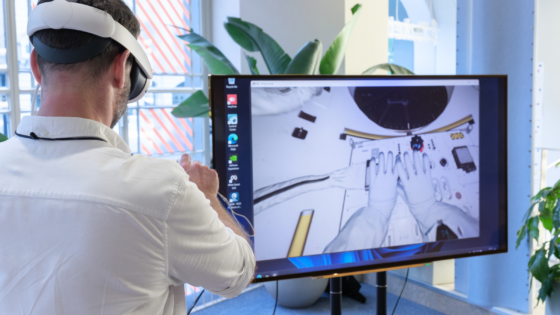Out with the old (venue) and in the with the new. On November 22 – 24, The Annual Hotel Conference (AHC) took shelter under a new roof, Manchester Central Convention Complex, where it welcomed more than 800 senior delegates to learn, network and party. Editor Hamish Kilburn was there to soak it all in…

For years, The Annual Hotel Conference (AHC) has been a major calendar event that has attracted leading investors, developers and operators from across the UK hospitality sector. In fact, the event has become so popular now, with more than 800 delegates to shelter safely that it required a venue change, from the familiar territory of Hilton Manchester Deansgate to where it is now held in the Manchester Central Convention Complex.
At the epicentre of the new venue was the auditorium, where more than 100 industry-expert speakers took to the stage over the two-day event, including senior leaders from global hotel brands. These included: Adela Cristea, Vice President, Head of Business Development UK & Ireland, Radisson Hotel Group; Satya Anand, President, EMEA, Marriott International; Stephen Cassidy, Senior Vice President & Managing Director UK, Ireland & Israel, Hilton; Philip Lassman, Vice President Development Northern Europe (UK&I, Benelux & Nordics), Accor; Dimitris Manikis, President & MD EMEA, Wyndham Hotels & Resorts; Karin Sheppard, Senior Vice President & Managing Director Europe, IHG and Camil Yazbeck, Senior Vice President, Head of Development Northern Europe, Accor.
- Image caption: The audience at The AHC 2021. | Image credit: Simon Callaghan Photography
- Image caption: The audience at The AHC 2021. | Image credit: Simon Callaghan Photography
Speakers took turns to deliver their views, strategies and visions for the future across four stages: vision, collaboration, innovation and transformation that represented the four pillars that underpinned this year’s theme ‘Change for Good.’ Amnd it was clear that there was a real sense of collective excitement and energy, and a renewed optimism for not only the recovery but also the opportunity to reset and reconsider the hospitality industry as a whole. People’s passions have seemingly been reignited. The conversation around ‘responsible recovery’ was discussed throughout the event, and seemed to spill into the discussions at the number of after parties around the city.
The hospitality industry is emerging from the pandemic with a long list of changed priorities. Values – in contrast to value for money – are creating new challenges for the hospitality industry. Sustainability and ESG (Environmental, Social Governance) are becoming ever-more important priorities for customers, operators, employees and owners.
Three inspiring leaders, Satya Anand, President EMEA, Marriott International; Dimitris Manikis, President & MD EMEA, Wyndham Hotels & Resorts and Karin Sheppard, SVP and MD Europe, IHG, discussed the characteristics of a ‘good brand,’ how people are increasingly conscious of ESG and that travel has become more purposeful. “ESG brings a unique opportunity to bring back young people into this sector,” said Manikis. “The future leaders of our industry — doing the right thing for humanity will bring the right people back.”
Karin Sheppard followed this up with the strong statement: “The best we can do today, is not the best we can do tomorrow. Be humble that we are all here to learn and we don’t have all the answers but without steep ambitions nothing will ever change.”
ESG came into sharp focus during the ‘Serviced Living — Capturing the New Demand’ session when Robert Godwin, Managing Director, Lamington Group made clear his strong feelings “with passion and intent there are ways to deliver truly sustainable buildings” and shared his company’s mission to deliver fully net zero carbon hotels in its portfolio.
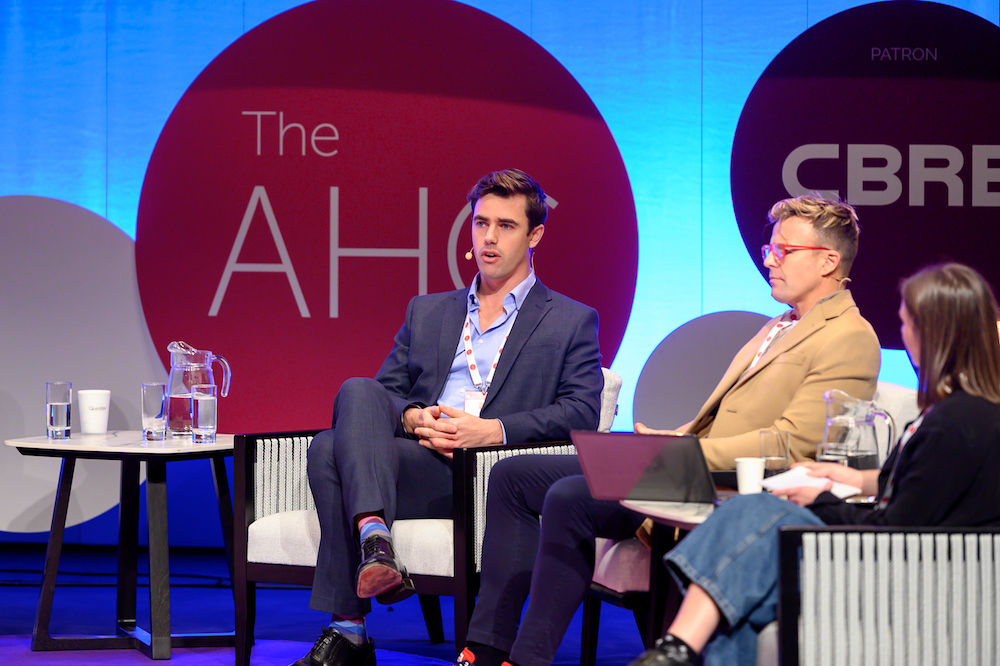
Image caption: Robert Godwin, Managing Director, Lamington Group speaking passionately about truly sustainable buildings. | Image credit: Simon Callaghan Photography
Lamington Group recently launched Room2 Chiswick, it’s first net zero carbon offering which is 89 per cent more energy efficient than other hotels in the UK. It’s 100 per cent electric, has a blue roof that can hold 50,000 litres of rainwater that filters down for use in the hotel and is covered with 200 tonnes of soil to grow a green roof to encourage biodiversity and insulate the building. Occupancy sensors inside the building manage heating lighting and cooling to provide energy efficiency savings.
Labour shortages are affecting the industry in a huge way and fixing the reputation of the hospitality industry is vital if staffing shortages are to be alleviated. The industry has an unfortunate association with long hours and low pay, something which was highlighted by keynote speaker Gary Neville, who owns GG Hospitality and runs the Stock Exchange Hotel and Hotel Football: “Hospitality staff have been treated poorly for far too long and the pandemic has highlighted that for me. People come first and they need trust and flexibility, empathy and compassion.”
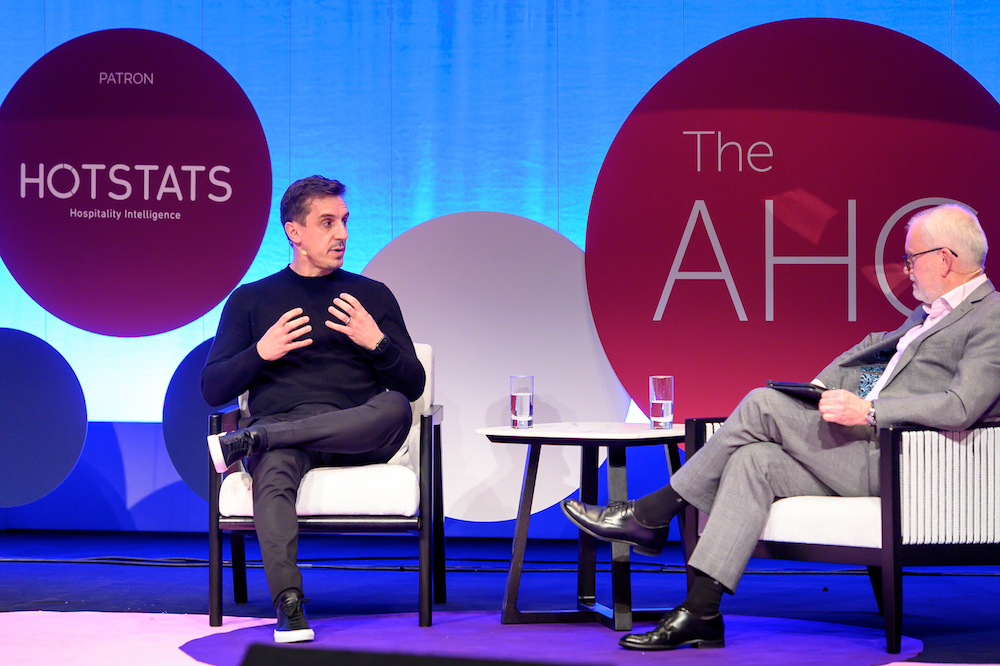
Image caption: Gary Neville, owner of GG Hospitality, said that ‘hospitality staff ghave been treated poorly for far too long.’ Image credit: Simon Callaghan Photography
In the ‘Power to the People’ session, Chris Mumford, Founder, Cervus Leadership Consulting, David Orr, CEO, Resident Hotels, Thomas Greenall, CEO, Bespoke Hotels and Harry Cragoe, Owner of The Galivant / Costel Hotels joined forces to address the supply of labour that has resulted in an awareness amongst hotel managers of the wellbeing of their staff.
Harry Cragoe said his business “is all about creating happiness” and he wants happy employees because it means guests are likely to be happy. “At The Gallivant, mini-bonuses of £10 are handed out each time a staff member is name checked by guests giving end-of-stay feedback. Monthly totals can be as much as £300-£400,” he added.
Nicholas Northam, who leads Interstate’s white-label operations at more than 120 hotels in the UK, Ireland, Continental Europe, Russia and CIS, said the labour shortage was less about the number of people available for work and more about the skills of potential employees. “We are looking at many different ways to find the talent we need,” Northam said. Among the programmes that may have previously fallen foul of a company’s behavioural sensibilities, Interstate has set up what he called “academies” in some UK prisons. Thanks to Interstate, Northam said, inmates were receiving instruction on kitchen and housekeeping roles.
Chris Dexter, CEO of Kew Green, in a directly political appeal to the UK Government about relieving pressure in the labour market said: “Open up the visa channels.” Pay rates were rising, he said, but jobs remained unfilled because there were insufficient numbers of people available for work.
Whilst the audience enjoyed hearing the anecdotal insights from the industry’s leading minds and the opportunity to learn from how they re-strategised following such a difficult period, cold hard numbers always win the day.
Thomas Emanuel, Director of STR hosted ‘Decoding the Revenue Data’ in which he gave comprehensive industry analysis — including how the UK has consistently outperformed Europe as a whole, and that Q3 UK occupancy had returned to pre-Covid levels: however, London and other large cities lag behind due to decreased international travel.
Meanwhile, in ‘Profits & Pricing’ Michel Grove, Chief Operating Officer at HotStats and Joe Stather Director, OPRE, Hotels, CBRE Hotels, asked do hotels still appeal to the investor community? Their discussion drew the conclusion that investor demands actually outstrip supply, which is supporting relatively buoyant pricing and in turn an increased number of deals is expected in 2022. They identified that profitability is weakest in London and the gateway cities, however these markets are seeing the strongest investor demand. The growing interest in alternative real estate is also being fuelled by increased investor demand.
Looking ahead, The AHC 2022 will take place on October 3 – 4 at The Manchester Central Convention Complex.
Main image credit: Simon Callaghan Photography

